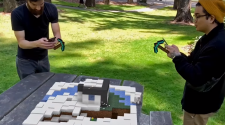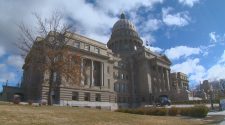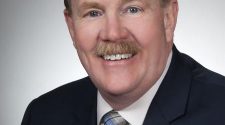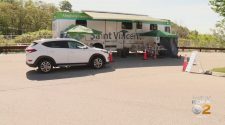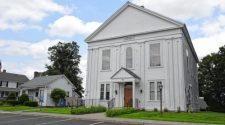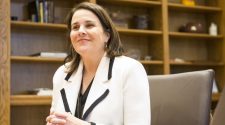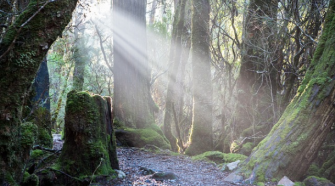SELMA, Ala. (AP) – Keshee Dozier-Smith hurried through the basement door of the aging Uniontown Municipal Building. She ignored the lectern at the front of the room where she was scheduled to give a talk, heading instead for the folding tables at the back where her employees were setting out the food.
She joined them, rolling up her leopard-print sleeves before opening containers of salad and chicken fingers.
Uniontown city workers trickled in, all of them men, all dressed for warmth and outdoor work. It was a chilly December afternoon.
Tall even in her flat, fringed boots, Dozier-Smith has the no-nonsense, seen-it-all demeanor of a high school principal. She’s a married mother of four.
And at 34, she’s the CEO of Rural Health Medical Program, a group of South Alabama community health clinics that serve some of the state’s poorest and most rural counties.
After the crowd at the Uniontown Municipal Building fixed their plates of food and returned to their folding chairs, Dozier-Smith strode to the lectern. She faced her small audience.
“How many of you go to the doctor each year to get your annual exam?” she asked. Nobody raised a hand.
Rural Health’s coverage area is a five-county swath of the Alabama Black Belt – Perry, Marengo, Dallas, Wilcox and Monroe counties. A region once Alabama’s agricultural and economic engine, it’s the cradle of the Civil Rights movement and the birthplace of Harper Lee.
Today it’s rich in heritage but poor in economic opportunities. More than a quarter of the population in most of the Black Belt lives in poverty. The median household income is far below the state average.
It’s also federally designated as medically underserved, which means it has too few primary care doctors, high infant mortality, high poverty.
But in the four years since Dozier-Smith took over at Rural Health, the company has opened three new clinics – in Monroeville, Demopolis and Thomaston – for a total of eight clinics across five counties. She’s about to launch a mobile unit to travel to small communities and provide primary care.
Her family has called the Black Belt home for generations. In rural, underserved places, it can take locals like Dozier-Smith with deep community ties to understand and fill in the gaps in healthcare, gaps that have traditionally left rural Alabama with poor outcomes for women and limited medical options for all residents.
“In rural communities, if people don’t know you, they don’t trust you and will not support you,” she said. “You want to be invited in; you don’t want to come in and set up shop and expect people to come to you.”
A few blocks from the Uniontown Municipal Building, past the Piggly Wiggly and the mostly shuttered storefronts of Water Street, a small brick building sits beside a public housing development.
It’s the Uniontown Health Center, a clinic managed by Rural Health that offers dentistry and primary care. When Dozier-Smith was a kid, it’s where she went to the doctor. He’s still there, in fact.
Dozier-Smith grew up here in the 1990s, in a family of educators, “where you could not break subject-verb agreement,” she likes to say. Her family could be found at the First Colored Missionary Baptist Church nearly any time the doors were open. Her grandfather operated a small store in town and often delivered vegetables he grew on his farm to the elderly. He once owned about 2,000 acres in Uniontown. He’s the one who donated the land where the public housing complex and clinic now sit.
As a child, Dozier-Smith watched her mother and grandmother struggling to make ends meet as teachers, while trying to be, in her words, “beacons of hope in the community.” The median household income in Uniontown today is around $18,000 a year, less than half the state average.
Dozier-Smith knew she wanted something different, even as a kid. She wanted to go into business.
Vera Davis first met Dozier-Smith at the church when she was 6 or 7.
“She’s always been a very assertive individual,” said Davis, a nursing professor at nearby Judson College. “She’s smart and intellectual. Very energetic. I could see the potential in her, even then.”
Davis lives in Uniontown and has served on the board at Rural Health for several years.
“I’ve seen such a drastic change (in Rural Health), as far as organization and transparency,” she said. “It’s a very underserved area, not just Uniontown, but all the Black Belt counties, and she’s been instrumental in bridging the gaps in healthcare disparities.”
A Uniontown employee said a quick prayer to bless the food before Dozier-Smith began her talk. She introduced herself, rattling off a list of kin who lived in the area. A few in the audience nodded; they knew some of those people.
“I remember being a little girl, going to the rural health clinic in Uniontown,” she said. “In the 90s, Uniontown was an amazing place to be. It was safe.”
She paused. “Coming back home, it’s a little more disappointing. I see family here, but the resources have not expanded to take care of the community, and that’s a problem to me.”
She told them about Rural Health, which could provide them primary and preventative medical care, regardless of their insurance status. It also offers social services like transportation to and from appointments and assistance with finding housing. It’s not just primary care, either; Rural Health offers dentistry, podiatry, optometry, and telehealth services for mental and behavioral health.
In rural areas like the Black Belt, reproductive and family planning services for women are fragmented across providers like county health departments, family doctors and emergency rooms. Under Dozier-Smith, Rural Health has stepped in to coordinate that care and connect women with the services and specialists they need.
Because of an agreement Dozier-Smith set up with the city of Uniontown, the employees’ copays get waived if they are insured, and if they aren’t insured they can get sliding-scale copays for as little as $15. About 40% of Rural Health’s patients are indigent.
As she looked out at the small group, it was hard to get a read on some of the older workers in the audience. A few of the younger men asked questions.
Uniontown, like many Black Belt communities, is majority black. There’s a longstanding mistrust of the medical establishment among some in the black community, particularly in this part of the state. Uniontown isn’t far from Tuskegee, the site of the notorious syphilis study performed on black men in the mid-1900s.
And there are many who can remember segregated hospitals, lower standards of care. “The history of racism weighs on the community heavily,” one local leader told a research group from the Kaiser Family Foundation earlier this year.
Before Rural Health moves into a community, Dozier-Smith spends hours at city council meetings, talking with the local newspaper, joining the chamber of commerce, inviting business owners to meet with her.
“You really do have to spend a good amount of time building those relationships and fostering that trust,” she said. “Then through word of mouth, through local support, you gain a supporter for life. That’s what I’m most interested in.”
Ludell Bryant was the school guidance counselor at Selma High School when she first met Dozier-Smith in the early 2000s. Dozier-Smith, then a student, would come into Bryant’s office looking for college scholarship applications.
“She was a smart girl, and she would challenge you in a minute,” Bryant recalled. “Not in a negative way; I got a kick out of it. Keshee was just one of a kind. Always walked with her shoulders back, with the persona of, ‘I know what I want, and this is what I have to do to get there.’”
And what the teenage Dozier-Smith wanted was to go to Spelman College, the historically black women’s liberal arts college in Atlanta. Bryant worried the expensive tuition would keep the school out of Dozier-Smith’s reach. But Spelman gave Dozier-Smith a full scholarship on the strength of her community service.
After college, she went to work for corporate giant Accenture and moved to Pittsburgh, then Houston. She married her high school sweetheart, Tavarius Smith. They had a son, Tavarius Jr. and daughter, Kahlan.
But the corporate world started to lose its allure. Dozier-Smith yearned to work somewhere she felt she could make a difference. She and her husband wanted to move back to Selma to be closer to family. They bought a 100-year-old bungalow near the center of Selma, not far from the Edmund Pettus Bridge. They did it because, they said, they wanted a piece of Selma history.
They began building Tavarius’ trucking company. Dozier-Smith’s plans for a nonprofit shelter didn’t work out. They had another daughter, Khariyah. Dozier-Smith tried to focus on helping at her husband’s company and being a stay-at-home mom to three young children.
But there came a point when she felt like she couldn’t fold another onesie without going crazy.
That’s when a family friend showed her an ad for an open position as CEO of Rural Health Medical, a nearly 40-year-old group of community health centers.
Earlier this year, the Georgiana Medical Center, located two hours southeast of Uniontown in rural Butler County, became the thirteenth hospital to close in Alabama since 2011. More than half of those shuttered hospitals once served rural populations.
Among the rural Alabama hospitals that are still open, nearly 90% operate in the red.
Dozier-Smith’s Selma office is next door to Vaughan Regional Medical Center, now the only hospital in a seven-county area that has a labor & delivery unit.
About half of Alabama counties don’t have single OBGYN, according to the American Congress of Obstetricians and Gynecologists. That includes some counties in the Rural Health coverage area, like Perry and Wilcox. Obstetrical specialists are 60+ miles away in Montgomery or Tuscaloosa or Birmingham.
The doctor shortage means that the kinds of services Dozier-Smith took for granted in Houston, where she had her first two babies, are almost nonexistent here, where she had her third and fourth babies.
“Here I drove 54 miles each way to my OBGYN,” she said. “In Houston, there were all kinds of pregnancy and childbirth classes, referrals to wellness centers, encouragement to sign up for lactation classes. To know that most of those are not even options in Selma, it’s hard.”
In Alabama, Medicaid covers half of all births. But the state chose not to expand Medicaid and has one of the strictest eligibility requirements in the nation. That means most Alabama women aren’t eligible for Medicaid coverage until they’re already pregnant.
“So there may be no prenatal care, birth education or family planning,” Dozier-Smith said. “And then you’re not aware of the health issues until it’s time to deliver.”
She’s talked with two Selma obstetricians about letting them use space at the Rural Health clinic in Selma, when it opens, to offer parenting classes, Lamaze and other birth-related services. She also recently hired an obstetrician to work at the new Rural Health center in Monroeville. Through his office, they plan to offer more preventative care for pregnant patients and assistance with family planning.
Three months after Dozier-Smith got the job at Rural Health, she called a meeting with her healthcare providers to discuss new changes she had planned.
One doctor, an older man, looked straight at her and said, “I’ve been employed 10 years here, and in my experience, people don’t tell doctors what to do; it’s the other way around.”
It caught her off-guard, but she remembers holding his gaze.
“If you want to be employed another 10 years, your mindset needs to change,” she said. “You aren’t working at a private practice, you’re working at a community health center.”
Eventually, she said, they became friends.
There are 14 other community health center networks that operate in Alabama in addition to Rural Health. Some of them are the same age as Rural Health but have healthy bank accounts and tens of thousands of patients, Dozier-Smith said.
“My question was, ‘Why doesn’t Rural Health have that?’” she said. “You start to see you’ve got to have the staff to support the work. When you find people who are just as passionate, they’re local and homegrown, or they’re just interested in this kind of public health work, that’s what helps a program last another 40 years.”
Dr. Meneka Johnson was a post-doctoral student at the University of Alabama when Dozier-Smith met her at a conference and they discussed their passion for public health.
The following day, Johnson said, “She came up to me and had a whole plan, and a notebook full of ideas, and asked if I was looking for a job.”
Johnson wasn’t, but was impressed by Dozier-Smith’s enthusiasm and vision for what Rural Health could be.
“She’s a dreamer, and you need people like that to take organizations to levels where they didn’t see themselves going,” said Johnson, who is now chief operating officer at Rural Health. “We’re nowhere near where she dreams us to be, but Rural Health isn’t where it was when she came here.”
Dozier-Smith had her fourth baby shortly after joining Rural Health and often brought her to work because she was still breastfeeding. Little Kallie Grace watched her mother from a playpen in the office.
A small rack of high-heeled shoes sits in the corner of Dozier-Smith’s office and extra changes of clothes still hang on the back of the office door. She’s constantly traveling, switching between work and family commitments. It leaves little downtime.
“I do not have a personal life, is what I’ll tell you,” she said. “With this job, and trying to be a great mom and wife, you do sacrifice things that you would normally do for yourself. But we try to be supportive of each other in our family and we try to make sure the people who help us are taken care of. Those things come back to you in the end.”
It was dark by the time Dozier-Smith got home to Selma.
Her daughters rushed her as soon as she opened the door of the house, calling “Mommy!” and jockeying to see who could be the first to show her the Christmas gifts they’d gotten at ballet class that afternoon. Her son Tavarius, 9, held back until they were done, watching with the long-suffering patience of an older brother who has three little sisters.
Dozier-Smith reached into her bag and pulled holiday antler hats for the girls and an elf hat for her son; they were headed to an evening Christmas program at their school. Her aunt, who was watching the kids while her husband was out of town, helped get them into their coats.
Dozier-Smith had been home a total of 15 minutes before it was time to leave again. She’d changed into a holiday dress back at the office.
Her son once asked her if she was a doctor. She told him no, she was more of a ‘fixer.’
“I take this job, being a mom and a wife and being part of the community that needs to progress, as a way to unravel the knots,” she said. “I was around loving people who took care of me as a little girl, and that brought me back home to be the director of this community program.
“Imagine all the children we care for now, imagine who they’ll grow up to be.”

